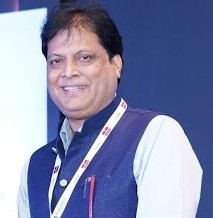Tanmaya Kumar Panda, head – HR at Universal Sompo General Insurance, and Amrit Jaidka Arora, head – HR at Digit Insurance, share the post-covid trends in HR:
Ravi Lalwani: Over the last 3 years, which HR activities were getting increasingly centralized and which were getting decentralized?

Tanmaya Kumar Panda
Tanmaya Kumar Panda: HR does not simply work within or as part of a business; it itself is increasingly being looked at as a business – with the pressure to produce, to add value, to make money. The emergence of advanced technology tools allows minute control and has tended to be better centrally manageable than earlier. Decentralization was a product of democratic instincts and not of business instincts. HR, as business, consequently, has veered more towards centralization than vice-versa in the last 3 years or so. Decentralization seems to be falling out of favour across the board. Information technology helps speed up recruiting, deciding accurately on the organization mandated retention-attrition balance, improving employee development, performance management and succession planning. In performing all these functions, in trying to reduce costs and optimizing processes, in acting as a profit centre, in makingcommunication effective and in making the whole employee force stay on the proverbial ‘same page’, the HR community seems to have concluded that these goals are achieved by making all key players work at the same centralized location.
Customer delight being the universally followed focus area for all businesses, HR as business again deems it necessary to operate centrally to ensure all parties to be fully aware of the overall organization strategy and to pull into the same direction.
Amrit Jaidka Arora: At Digit, we have recently moved to a zonal structure owing to the expaning geographies. Activities such as recruitment, skip level meetings, employee engagement and induction sessions have been decentralised. We have given all our office heads easy access to data and insights for their teams. However, performance management and payroll remain centralized functions.
What changes have happened as a result of the challenges posed by covid?

Amrit Jaidka Arora
Tanmaya Kumar Panda: The covid crisis might have reinforced the trend; might have fast-tracked the centralization process. It is because mobility is a casualty and because control through mobility is no longer available as an option. Organizations which followed the legacy systems would plan to switch to modern technology systems. Organizations which followed decentralized or hybrid structures would shift to centralized HR with as much promptness as possible. Even functions which were left delegated – like employee training, skilling, re-skilling – would move back to the centre.
Amrit Jaidka Arora: A situation like this prevents communication and takes away our opportunity to interact with other teams and understand what they have been doing. The biggest challenge is to exploit all possible channels of communication. All processes must move online – with virtual induction sessions, virtual trainings and video conferences instead of face to face meetings and even virtual employee engagement to keep the morale up. Challenge is to engage with a remote workforce.
Will these changes be temporary or permanent? What is the role of technology in the HR functions?
Tanmaya Kumar Panda: The trend set by the covid crisis would most likely be irreversible. It is the reason that the centralization trend was already commanded and facilitated by technological advancements. Continually monitored value-adding ability is the trigger for HR as for any other business. Control, ceaseless central control, is the method. Technology is the facilitator, the tool; centralization is the outcome and covid has proved to be the accelerator.
Amrit Jaidka Arora: We do not see the full work force coming back to offices and this will be the new normal. So yes, being ready with virtual solutions will be a permanent feature in HR. We have used technology to the maximum to keep communication going in our teams. Lifesize, Microsoft Teams, Zoom, etc have been utilized. Technology has decentralized data for HR making complex information and analytics available for all.
HR has been instrumental in rolling out all the technological initiatives and making acceptance possible. A big example would be how Digit has managed to make work from home successful and has derived the best possible results from the business continuity plan. We have launched our ‘At Home Training’, by which we have addressed knowledge gaps through product training across geographies and teams. We have Online Huddle Day for all those who joined us virtually during the lockdown. Sessions have been informative, interactive and truly a success. Daily team calls and e-meetings help to track work.We have also introduced ‘Virtual Happy Hours’ to boost the morale and reinforce human connections, where the idea is to have a video call just to chat, play a game, meet and greet each other’s families.







